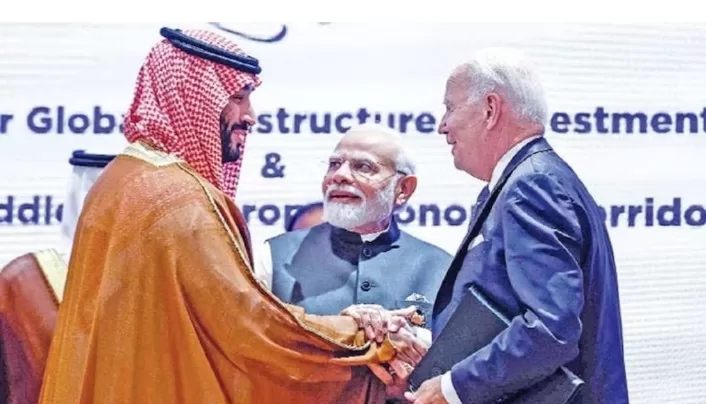In the grand scheme of economic connectivity, the fate of the India-Middle East-Europe Economic Corridor (IMEEC) appears uncertain as the ongoing conflict between Israel and Hamas casts a looming shadow over its prospects.
Announced amidst the glitz of the New Delhi summit of G20 nations, the ambitious IMEEC was envisioned as a beacon of economic integration and connectivity. Back in September, India orchestrated a significant partnership, including the United States, United Arab Emirates, Saudi Arabia, European Union, Italy, France, and Germany, with a goal to foster economic collaboration spanning from South Asia, across the Arabian Gulf, and into Europe. Notably, it has been positioned as an alternative to China’s controversial Belt and Road Initiative (BRI).
Mayank Jha, a Senior Economist at HDFC Bank, expressed his view on the matter, stating, “When embarking on a project of such magnitude, it is inevitable that the turbulent Middle East would be taken into consideration. However, there is no denying that delays and repercussions are on the horizon.”
The prosperity of this ambitious economic corridor is intricately tied to the relationship between Israel and Saudi Arabia, and the ongoing escalation of hostilities between Tel Aviv and Gaza now places it in peril. N. R. Bhanumurthy, Vice-Chancellor of the BR Ambedkar School of Economics, emphasizes that IMEEC may be compelled to take a backseat in these circumstances.
Prabal Sen, a Research Analyst at ICICI Securities, sheds light on the broader implications, saying, “The progression of the Saudi-Israel deal would have symbolized the dehyphenation of Saudis and Russia, a significant victory not only for the United States but also for global energy markets. While the economic corridor is held up, the resolution of this deal holds the key to keeping Russia and Saudi Arabia as natural allies in the global energy landscape.”
These insights were shared by experts during a virtual panel discussion on October 10, focusing on the Israel-Gaza conflict.
In what was perceived as a stride toward the normalization of relations between the Arab world and Tel Aviv, the United States played a pivotal role in brokering the Abraham Accords under the leadership of former President Donald Trump. These accords marked the establishment of diplomatic ties between Israel and the Gulf States of Bahrain and the United Arab Emirates. Subsequently, Israel inked agreements with Morocco and Sudan.
Earlier this year, Saudi Arabia and Israel embarked on diplomatic talks to normalize relations, underpinned by U.S. support. Nevertheless, experts are now apprehensive that the intensifying conflict between Israel and Gaza may jeopardize these efforts, and in turn, have ramifications for the proposed economic corridor.






